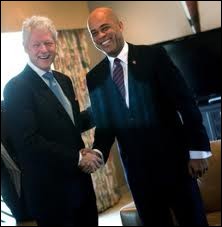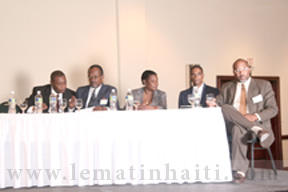
President Michel Martelly and former U.S. President Bill Clinton
“One of the biggest problems in growing the Haitian economy is that there is really no facility that grants small business loans on reasonable terms,” said former U.S. President Bill Clinton at the launch of a new business loan program in Haiti. The entrepreneurial communities applauded the initiative that will not only help strengthen the country’s feeble economy, but also generate new avenues for growth and structural development.
Clinton, co-chairman of the Interim Haiti Recovery Commission, granted the first loan of $415,000 to Caribbean Craft, a company specialized in creating and exporting artistic goods such as sculptures, carnival masks and paintings. Its workshop was among the company’s many losses during the Jan. 12 earthquake. The loan carries a 6.5 percent interest rate; all of which- according to Clinton- will help the $20 million program provide future loans to other small businesses.
Earlier this month, the Clinton Bush Haiti Fund (CBHF) announced a $2 million grant also aimed at economic development. TechnoServe, a non-governmental organization, received the grant to fund Haitian Business Accelerator (HBA), a new program designed to transform the country’s small businesses into investment-ready, bankable companies. The NGO specializes in developing small businesses and industries in poor and developing countries. Since its 1968 founding by philanthropist Ed Bullard, TechnoServe’s global presence expanded beyond 40 countries, employing more than 900 people.
The organization’s latest Haitian projects involved partnerships with the Coca-Cola Company, the Inter-American Development Bank (IDB), CBHF and Odwalla to develop a sustainable mango industry in Haiti through the Haiti Hope Project (HHP). According to their release statement, the $8.5 million program would help increase the income of some 25,000 small farming families. More recently, TechnoServe completed the Mon Enterprise, Mon Avenir (My Business, My Future) business plan competition that, through intense business plan development, guided over 80 promising Haitian entrepreneurs.
“With the exception of a few large companies, Haiti’s formal business sector is very small,” said Paul Altidor, Vice President for programs and investments for CBHF. While acknowledging the significant losses businesses of all sizes suffered since last year’s earthquake, Altidor maintained, “Small and growing enterprises hold the potential for transforming Haiti’s economy.” Last year, the United States Agency for International Development (USAID) funded WINNER, a study that assessed the post-quake devastation of Haitian

FHAPME launching Institutional Reinforcement
businesses: formal and informal. WINNER concluded, rather than the previous 30 percent estimates, 80 percent of private sector businesses tanked during the earthquake.
The difficult loan terms imposed on Haitian businesses, even those with solid credit, “surprised and disturbed” former President Clinton when he learned about them. “On the Haitian market,” said Magalie Dresse referring to the punishing terms of business loans, “the lowest we’d be getting was between 12 and 15 percent, plus we had to add to it the fees that come with it.” She is the owner of Caribbean Craft, and planned to use her loan to meet current demands and provide employment for 200 people. “The space we have is so small,” said Dresse, “we can’t welcome enough people to continue orders.” She recently secured several contracts at a buyer’s conference in New York from representatives of Macy’s, Pottery Barn and other companies.
Echoing these sentiments, Altidor agreed, “these enterprises needed business acumen and access to financial services in order to attract the private investment they need to develop,” stressing that TechnoServe would help them overcome that hurdle through the HBA.
Reinforcing those business development initiatives, the Haitian Federation of Micro Small and Medium Enterprises (FHAPME) recently introduced Institutional Reinforcement, another program fashioned to cultivate a functional framework for the country’s large, yet informal small business segment. According to Yanick Mezile, chairperson of the Small and Medium Businesses Council, the lack of structural development constituted a major obstacle for those businesses. Since its 2008 inception, FHAPME aimed to strengthen and formalize the small business community, articulated Philippe Gerome, coordinator of Institutional Reinforcement.

Former President Bill Clinton visiting Caribbean Craft
While the organization would not provide loans to small business, its focal point would be educational and administrative, thus arming entrepreneurs not only with basic business education, but also teaching them effective management styles. As Gerome explained, “For the first year, we will focus on existing businesses,” hence ruling out newly created businesses. Furthermore, the program would require membership to FHAPME, 500 Haitian gourdes (HTG) contribution (U.S. $12.43) and active participation in problem definition for the informal business sector.
Small business development, although a paradigm shift in Haiti’s economic model, is not a revolutionary idea. In fact, the U.S. economy, currently the largest in the world, thrived on this model. The Small Business Administration published the following 2007 figures, attesting to the central role small firms played in the U.S. economic boom.
• They represent 99.7 percent of all employer firms.
• Employ just over half of all private sector employees.
• Pay 44 percent of total U.S. private payroll.
• Have generated 64 percent of net new jobs over the past 15 years.
• Create more than half of the non-farm private gross domestic product (GDP).

Former Presidents George W. Bush and Bill Clinton
Such economic endeavors constituted a vital step that could potentially rival large financial institutions and set Haitian ingenuity ablaze, but most importantly, they could help eradicate the foreign aid economic model that, for too long, outsourced the nation’s hope. An independent, resourceful middle class would propel the Haitian economy to new heights while bridging the enormous gap between the social classes. Nevertheless, without a robust economic infrastructure reinforced by competent governmental leadership, such efforts could prove futile in the face of a socially irresponsible upper class.
In addition to the new loan program, the former American leader also sought to revitalize Croix-des-Bouquets’ metal artistry. Located just 8 miles north of Port-au-Prince, the city watched its metal artisans starved after the devastating earthquake. Clinton hoped that 40 tons of steel parts, shipped to Haiti by Ohio-based steel drum manufacturer and member of Clinton Global Initiative Grief Inc., would help improve the lives of an estimated 8,000 people who depended on the income produced from metal artistry. “After the earthquake, I didn’t have work because markets closed, and the material in the market was too expensive to buy,” 38-year-old metal artisan Jean Pierre Richard Desrosiers told the Associated Press. “Now with this material,” he continued, “we can make a profit for the entire community.” Speaking to the collective of artisans in Croix-de-Bouquets, Clinton articulated, “on the long run, what Haiti needs most is for the ability of every Haitian to make a good living doing what he or she can do best.”